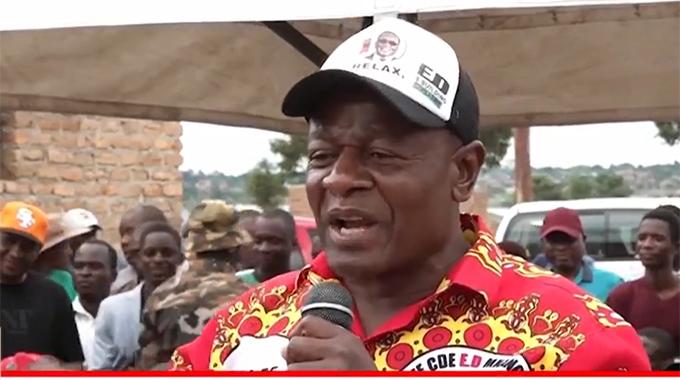News / Local
Mnangagwa henchman's probe raises eyebrows
31 Aug 2025 at 09:29hrs |
3 Views

Local Government and Public Works Minister Daniel Garwe's call for a special taskforce to investigate councils has triggered sharp debate, with critics accusing the government of seeking tighter control over opposition-led urban authorities.
Garwe announced last week that his ministry, working with the Zimbabwe Anti-Corruption Commission (ZACC), would set up a "special taskforce" to investigate all 92 local authorities — 32 urban and 60 rural — over suspected governance and administrative malpractices.
"The Ministry of Local Government and Public Works, in collaboration with ZACC, is setting up a special taskforce to exclusively investigate local authorities and ensure that allegations raised against councils and their officials are thoroughly investigated and resolved," Garwe said.
The ministry already holds extensive supervisory powers under the Urban Councils Act, which allows the minister to approve senior council appointments, sign off on budgets, and even dismiss elected councillors and mayors. Central government also controls budget disbursements to councils.
Critics argue the new directive is less about accountability and more about political manoeuvring. Observers noted that the move disproportionately affects opposition-led councils, raising concerns that it could be used to justify arrests of senior officials on corruption charges while sidelining elected representatives.
"This is clearly politics at play," said Jonathan Mataka of Chinhoyi. "The main reason is to smuggle back some of ZANU PF's losing candidates, especially in opposition-led urban councils. We are likely to see new commissions installed who will get more perks, milking residents' revenue."
Others questioned the necessity of a taskforce when internal audits and Auditor General reports have already laid bare widespread financial mismanagement in councils.
"It's like the Ministry of Finance creating a taskforce to investigate itself on why Zimbabwe has black market rates," said Dickson Mutasa, a Mutare resident. "Something is not right."
A Gweru-based human rights advocate, who asked not to be named, accused the government of ignoring existing evidence of corruption. "The Auditor General has exposed financial flows. These are pure criminal cases that need no further investigation, yet the minister has given no directive. He wants to channel resources to a new taskforce while turning a blind eye to existing evidence."
Chitungwiza Residents and Ratepayers Association chairperson Arthur Taderera said central government interference is part of the rot that has crippled local authorities. He accused the state of double standards, arguing that it has undermined councils by removing executive mayors, diverting funds, and protecting land barons.
"For the central government to act as a cleaning agent is suspicious," Taderera said. "The majority of councils run by opposition parties are being targeted. Government itself owes millions to councils, a tactic to punish residents for their choice."
Analysts also drew parallels with past political interference. In 2013, former president Robert Mugabe ordered councils to write off residents' rates and water bills in the run-up to elections, a populist move that left municipalities in financial ruin.
For many, Garwe's directive signals a repeat of old tactics — using central government leverage to weaken opposition-run councils while deepening mistrust between residents and the state.
Garwe announced last week that his ministry, working with the Zimbabwe Anti-Corruption Commission (ZACC), would set up a "special taskforce" to investigate all 92 local authorities — 32 urban and 60 rural — over suspected governance and administrative malpractices.
"The Ministry of Local Government and Public Works, in collaboration with ZACC, is setting up a special taskforce to exclusively investigate local authorities and ensure that allegations raised against councils and their officials are thoroughly investigated and resolved," Garwe said.
The ministry already holds extensive supervisory powers under the Urban Councils Act, which allows the minister to approve senior council appointments, sign off on budgets, and even dismiss elected councillors and mayors. Central government also controls budget disbursements to councils.
Critics argue the new directive is less about accountability and more about political manoeuvring. Observers noted that the move disproportionately affects opposition-led councils, raising concerns that it could be used to justify arrests of senior officials on corruption charges while sidelining elected representatives.
"This is clearly politics at play," said Jonathan Mataka of Chinhoyi. "The main reason is to smuggle back some of ZANU PF's losing candidates, especially in opposition-led urban councils. We are likely to see new commissions installed who will get more perks, milking residents' revenue."
"It's like the Ministry of Finance creating a taskforce to investigate itself on why Zimbabwe has black market rates," said Dickson Mutasa, a Mutare resident. "Something is not right."
A Gweru-based human rights advocate, who asked not to be named, accused the government of ignoring existing evidence of corruption. "The Auditor General has exposed financial flows. These are pure criminal cases that need no further investigation, yet the minister has given no directive. He wants to channel resources to a new taskforce while turning a blind eye to existing evidence."
Chitungwiza Residents and Ratepayers Association chairperson Arthur Taderera said central government interference is part of the rot that has crippled local authorities. He accused the state of double standards, arguing that it has undermined councils by removing executive mayors, diverting funds, and protecting land barons.
"For the central government to act as a cleaning agent is suspicious," Taderera said. "The majority of councils run by opposition parties are being targeted. Government itself owes millions to councils, a tactic to punish residents for their choice."
Analysts also drew parallels with past political interference. In 2013, former president Robert Mugabe ordered councils to write off residents' rates and water bills in the run-up to elections, a populist move that left municipalities in financial ruin.
For many, Garwe's directive signals a repeat of old tactics — using central government leverage to weaken opposition-run councils while deepening mistrust between residents and the state.
Source - The Standard
Join the discussion
Loading comments…


































